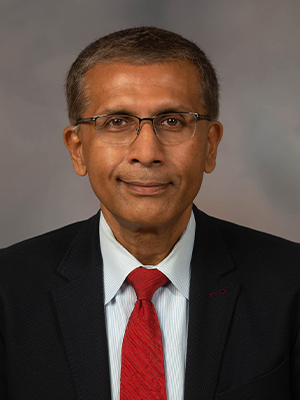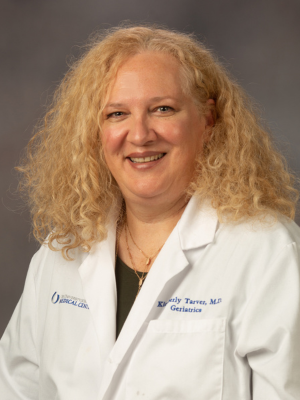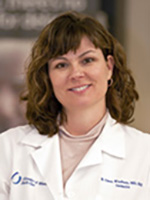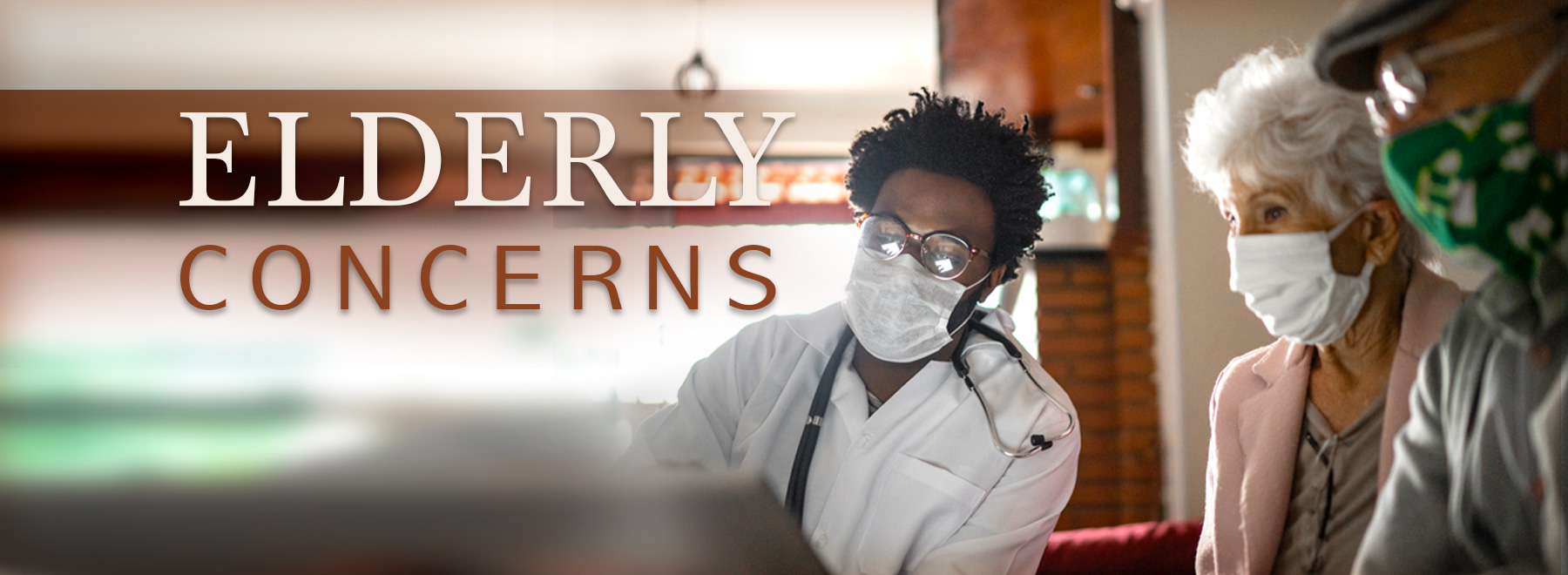How might geriatric health care look in a post-COVID-19 world?
Once an honest-to-goodness COVID-19 vaccine is unmasked, that doesn’t necessarily mean all of us will be, too.
Health care and social changes wrought by this pandemic, including the rise of telehealth, social distancing and, yes, mask-wearing, may not completely disappear even when the viral menace has faded.
This is especially so for people older than 60, experts at the University of Mississippi Medical Center say.

“A vaccine is desperately needed, and we should hope for the best possible one,” said Dr. Javed Butler, Patrick A. Lehan Chair in Cardiovascular Research and professor and chair of medicine at UMMC. “But it may not be a get-out-of-jail-free card. Even when a vaccine is available, you don’t want to be exposed to the disease; there are still so many things we don’t know about it. And we won’t know the effectiveness of the vaccine right away.
“That means higher-risk individuals should continue to take the measures they are taking right now; those include older people, transplant recipients or immunocompromised patients like those with cancer. To make a comparison, even when you get the flu vaccine, you still take flu precautions.”

For that reason and others, facial coverings may be around for a while, said Dr. Kim Tarver, assistant professor of medicine in geriatrics at UMMC.
“I do think masks are going to be more commonplace than they were before the pandemic,” Tarver said. “I believe that during the flu season, people will continue to protect themselves.
“We have learned more about how these diseases spread and how masks can protect you. And we should do research to learn even more.”
But few things have changed more than the ways patients, particularly seniors, have been receiving health care. Adjustments likely to remain entrenched and enlarged include those in telehealth, vaccinations and the delivery of prescription medicine.
Telehealth
“Telehealth works,” Butler said. “It can fundamentally change the health care experience. This is especially the case for older patients.
“They may not be able to drive themselves, and their kids may have to take off of work to bring them to the doctor.”
Instead, the patients could visit, virtually, even with more than one doctor per telehealth session.

Some patients have resisted the virtual alternative, though, said Dr. Gwen Windham, UMMC professor of medicine in geriatrics, whose cases include Alzheimer’s disease and dementia.
“At times, when we have tried to change a visit from in-person to virtual for safety, patients have refused,” Windham said. “In other cases, they did not have a good internet connection at home.
“But for those who are willing and able, especially if they live far from the Medical Center, they can avoid hours of driving and getting up early. Otherwise, it’s such a long day that they’re exhausted halfway through it. So virtual visits can be beneficial for them.”
So beneficial, she said, that technology continues to adapt to meet their needs.
“There is a company that makes a type of iPad geared toward older users; it’s called GrandPad.”
With large fonts and buttons, a stylus and other features, the device can also be customized.
“It’s a way to enable more virtual health care visits,” she said.
Telehealth can also empower patient education, Butler said.
“That’s something we’re not doing a good job of right now. That includes giving patients a clear understanding of what their medications do, including interactions. They also may be getting competing dietary recommendations from their physicians, depending on the different conditions they are being treated for.
“So I’m excited about the idea of virtual patient education classes. Twenty-five patients could log in at the same time and do 30 minutes of lessons. That’s how we need to be thinking.
“My hope is that government regulations and health insurance companies will facilitate telehealth – develop solutions to address patient privacy, for instance – and that the health care system will become more patient-friendly.”
In the current COVID-19 world, telehealth has already become more workable, Tarver said, thanks in part to Medicare loosening restrictions on payments to providers
“My prediction is we will continue to use telehealth, probably more so for the geriatric population than for others, especially if Medicare continues these reimbursements and insurance companies follow suit.
“Through telehealth, geriatricians and a lot of other specialists can reach more patients who live in rural Mississippi.”
Vaccinations
Before the pandemic, drugstores were already an alternative to doctors’ offices for such vaccinations as flu shots. Germ-phobic seniors may be prone, now more than ever, to do their shot shopping this way.
“I don’t know if it’s necessarily safer to go pharmacies, but it is more convenient,” Tarver said. “There are some vaccines, such as one for shingles, which we don’t even keep in our clinic that patients can get elsewhere.
“And I hope there will be a bigger buy-in, in general, by patients to get vaccines now that the public has become more aware of the dangers of these infectious diseases. Specialists have been warning us about them for years. They’re not Chicken Little anymore. We believe them now.”
Prescription Delivery
Most of Tarver’s geriatric patients are already used to digging through junk mail and water bills for their medications – that is, those who have prescription coverage through Medicare.
“Their Medicare coverage is better if they get their medicine through the mail,” she said. “Insurance companies, too, will give you a break on co-pays when you can order, say, a three-month supply.
“Also, as many of the larger pharmacies have been doing, you may see smaller pharmacies offering curbside and drive-through service. Some pharmacies may offer delivery directly to patients’ homes.”
The Price
Those three changes in health care delivery have been, more or less, for the better. But, with some adjustments, there comes a price that is much larger than any copay: the wages of isolation and social distancing.
“We are not paying enough attention to this nationally,” Butler said. “Even with young, active, mobile families, this is taking a toll on emotional health. So it really gets complicated for older people.
“It is one thing to glibly say that young people have a smaller chance of mortality, so let them go about their business and let’s isolate the older people. We’re talking as if they live in two different worlds.
“The whole quality of life for the elderly is related to their kids and grandkids. For older people who experience the pain and suffering that can come with aging, part of the reason they can tolerate this is they can look forward to the role their family plays in their lives.
“If you take all of that away, it will affect them psychologically. And you may see their health care behavior, their precautions, slip if they get depressed due to isolation from family and grandkids.”
Young or old, most people crave these personal relationships, Windham said.
“And staying engaged with others is good for brain health.”
Many elders already felt disengaged before the pandemic, Tarver said.
“Keeping them sequestered forever will not be viable. Younger family members may stay away from them altogether because they don’t want to bring an illness to mom or dad that may take their life.
“But mom and dad may say, ‘I would rather die than not see you.’ I’ve seen this across the board. It’s even affecting us as physicians, this lack of personal connections.
“There’s still a lot of learning to do in terms of what we are all willing to do to protect the community versus the risks we are personally willing to take. We live in an individualistic society, but this virus has forced us to think about the entire population, about population health. For Americans, that has probably been the biggest change.”
The above article appears in CONSULT, UMMC’s monthly e-newsletter sharing news about cutting-edge clinical and health science education advances and innovative biomedical research at the Medical Center and giving you tips and suggestions on how you and the people you love can live a healthier life. Click here and enter your email address to receive CONSULT free of charge. You may cancel at any time.



